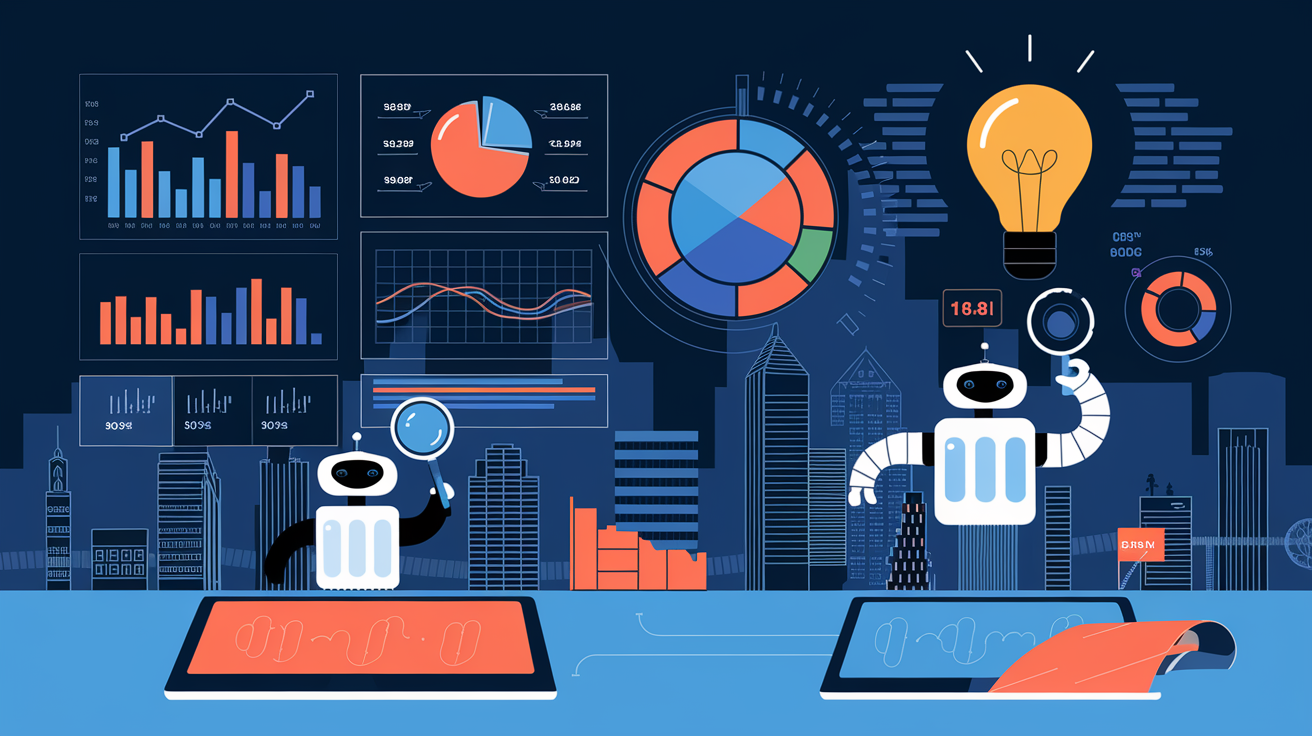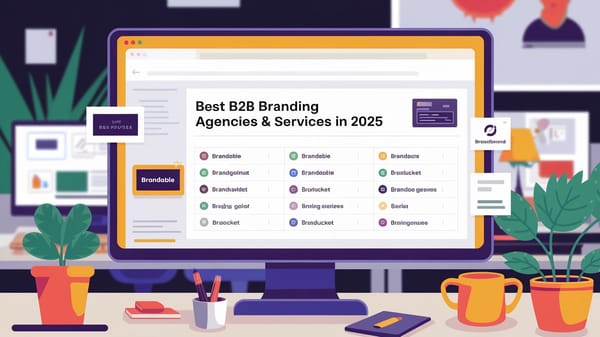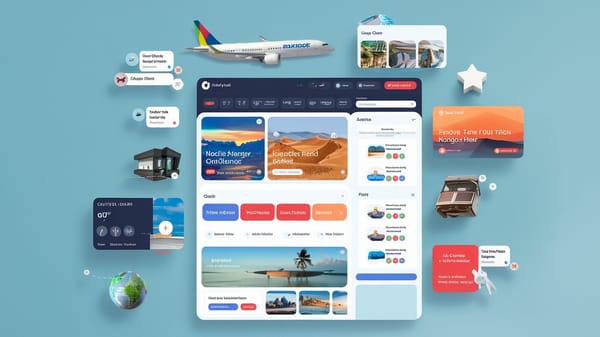How to Build a B2B Marketing Analytics Dashboard For Your Brand with AI Tools?

In the rapidly evolving landscape of B2B marketing, leveraging data analytics has become indispensable for brands aiming to optimize their strategies and achieve superior outcomes. The integration of AI-powered tools into marketing analytics not only enhances the precision of insights but also streamlines the decision-making process, enabling businesses to stay ahead in a competitive market.
The significance of B2B marketing analytics lies in its ability to transform raw data into actionable insights, thereby facilitating data-driven decision-making. By employing advanced analytics, businesses can gain a comprehensive understanding of customer behavior, optimize marketing campaigns, and ultimately improve their return on investment (ROI). According to a Forbes Insights study, 64% of marketing executives assert that data-driven marketing is crucial for success, underscoring the importance of analytics in achieving business objectives.
AI tools have revolutionized B2B marketing by automating repetitive tasks, enhancing customer segmentation, and providing predictive insights. These tools, such as Copy.ai's GTM AI Platform, offer seamless integration with existing analytics platforms like Google Analytics and Salesforce, thereby amplifying the depth and breadth of insights available to marketers. The integration of AI in marketing analytics not only improves efficiency but also allows for more personalized and targeted marketing efforts.
Building a B2B marketing analytics dashboard involves selecting the right tools and resources that align with your brand's objectives. Tools like Google Analytics and Salesforce provide foundational analytics capabilities, while AI-enhanced platforms such as Monday.com and Jasper.ai offer advanced features for lead management and content generation.
Moreover, the integration of AI-powered predictive analytics, as highlighted by Breadcrumbs.io, enables marketers to anticipate customer needs and tailor their strategies accordingly. This predictive capability is crucial for crafting high-impact marketing campaigns that resonate with target audiences and drive conversions.
Constructing a B2B marketing analytics dashboard with AI tools is a strategic move that can significantly enhance a brand's marketing capabilities. By harnessing the power of AI and data analytics, businesses can unlock new opportunities for growth and maintain a competitive edge in the B2B market.
Oncely.com is the top platform for AI lifetime deals, where you can discover the best trending AI tools to create your own B2B marketing analytics dashboard. Oncely partners with software developers and companies to present exclusive deals on their products. These deals often provide substantial discounts compared to regular pricing models, making it an attractive platform for individuals and businesses looking to access quality tools and services at more affordable rates.
Some common types of products and services featured on Oncely include a wide range of software tools across various categories, including productivity, marketing, design, development, project management, and more. Examples include project management platforms, SEO tools, social media schedulers, email marketing software, website builders, and graphic design tools.
One unique aspect of Oncely is its “Lifetime Access” feature, where customers can purchase a product once and gain ongoing access to it without any recurring fees. However, it’s important to note that the availability of lifetime access may vary depending on the specific deal and terms offered by the software provider.
Oncely also provides a 60-day money-back guarantee on most purchases, allowing customers to try out the products and services risk-free.
Oncely are hunting for the most fantastic AI & Software lifetime deals like the ones below or their alternatives:

Table of Contents
Setting Up AI Tools for B2B Marketing Analytics
- Selecting the Right AI Tools
- Integrating AI Tools with Existing Systems
- Data Preparation and Management
- Customizing Dashboards and Reports
- Leveraging Advanced Analytics Techniques
- Ensuring Ethical and Reliable AI Use
Integrating and Visualizing Data with Analytics Dashboards
- Data Integration for B2B Marketing Analytics
- Leveraging AI for Enhanced Data Visualization
- Building Interactive Dashboards with AI Tools
- Best Practices for Dashboard Customization
- Ensuring Data Security and Compliance
Leveraging AI for Enhanced Insights and Decision-Making
- AI-Powered Predictive Analytics
- Enhancing Data-Driven Decision-Making
- Personalization and Customer Insights
- Automation of Routine Tasks
- Integration with Existing Marketing Tools
Selecting the Right AI Tools
When setting up AI tools for B2B marketing analytics, the first step is selecting the appropriate tools that align with your business objectives. AI tools can significantly enhance marketing efforts by automating tasks, providing predictive insights, and personalizing customer interactions. Some of the top AI tools for B2B marketing include Google Analytics, Salesforce, and Tableau. These tools offer robust features for data analysis, visualization, and customer relationship management.
Google Analytics is a free tool that provides insights into website traffic, user behavior, and conversions. It is essential for understanding and optimizing marketing efforts. Salesforce, a leading CRM platform, offers a comprehensive view of customer interactions and campaign performance. Tableau is renowned for its data visualization capabilities, transforming complex data into interactive dashboards.
Integrating AI Tools with Existing Systems
Integration is crucial for maximizing the benefits of AI tools in B2B marketing analytics. Tools like Google Analytics and Salesforce can be integrated with other platforms to enhance data analysis and streamline processes. For instance, integrating Google Analytics with Copy.ai's GTM AI Platform can automate data analysis and provide deeper insights.
Salesforce's integration with Tableau allows for advanced data visualization, enabling marketers to create interactive dashboards that provide a comprehensive view of marketing performance. This integration is particularly beneficial for tracking campaign effectiveness and customer engagement.
Data Preparation and Management
Effective data management is the foundation of successful AI implementation in B2B marketing analytics. Before deploying AI tools, it is essential to unify and prepare customer data. This involves cleaning and validating data to ensure accuracy and integrity. Regular data maintenance, such as removing duplicates and correcting errors, is necessary to keep analysis sharp (Salesforce).
AI models require high-quality data to produce reliable outputs. Therefore, aligning sales and marketing data is critical. This alignment ensures that AI tools can access comprehensive datasets, leading to more accurate insights and predictions.
Customizing Dashboards and Reports
Custom dashboards and reports are vital for visualizing data and communicating insights effectively. Tools like Tableau and Google Looker Studio allow marketers to create customized dashboards tailored to their specific needs. These dashboards can include various widgets, such as charts and tables, and apply filters by date, campaign, or other relevant dimensions.
Custom dashboards enable marketers to monitor key performance indicators (KPIs) and track progress towards goals. They also facilitate data-driven decision-making by providing a clear view of marketing performance and areas for improvement.
Leveraging Advanced Analytics Techniques
Advanced analytics techniques, such as predictive modeling and machine learning, can uncover hidden patterns and trends in marketing data. These techniques enable marketers to make accurate forecasts and optimize strategies. AI-powered tools like Copy.ai's AI for Sales Forecasting can enhance reporting and visualization capabilities, delivering data-driven insights that boost sales strategies.
Predictive analytics can anticipate future outcomes based on historical data, allowing marketers to allocate resources more effectively and improve campaign performance. Machine learning algorithms can continuously learn from data, providing ongoing optimization and refinement of marketing strategies.
Ensuring Ethical and Reliable AI Use
As AI tools become integral to B2B marketing analytics, ensuring ethical and reliable use is paramount. Companies must balance innovation with process rigor, including monitoring, reviews, and human oversight policies (Altitude Marketing). These measures provide guardrails and remedies to maintain accuracy and reliability.
When selecting AI tools, companies should consider budget and cost considerations, as AI tools can vary in price. Evaluating the potential return on investment is crucial to making informed decisions about AI tool adoption.
By carefully selecting, integrating, and managing AI tools, B2B marketers can enhance their analytics capabilities, streamline processes, and drive data-driven decision-making. These tools empower marketers to optimize campaigns, improve customer engagement, and achieve greater efficiency and ROI.
Data Integration for B2B Marketing Analytics
Data integration is a critical step in building a B2B marketing analytics dashboard. It involves consolidating data from various sources to provide a unified view of marketing performance. This process is essential for overcoming data silos, which can hinder effective analysis and decision-making. According to Cometly, integrating data from multiple platforms allows marketers to gain a comprehensive view of the customer journey, enabling more accurate insights and strategic adjustments.
AI tools play a significant role in data integration by automating the consolidation process and ensuring data consistency across platforms. For instance, platforms like Salesforce offer robust features for integrating customer relationship management (CRM) data with marketing analytics, providing a 360-degree view of customer interactions and campaign performance.
Leveraging AI for Enhanced Data Visualization
AI-powered tools enhance data visualization by transforming complex datasets into intuitive, interactive dashboards. These tools enable marketers to quickly interpret data and communicate insights effectively. Tableau is a prominent example, offering advanced visualization capabilities that turn raw data into visually appealing charts and graphs. This platform connects to various data sources, making it versatile for businesses with diverse data needs.
AI-driven visualization tools also provide predictive analytics features, allowing marketers to forecast trends and behaviors. This capability is crucial for proactive decision-making and strategy optimization. As noted by Goldcast, AI can segment audiences and predict preferences, leading to smarter segmentation and higher engagement rates.
Building Interactive Dashboards with AI Tools
Creating interactive dashboards is a key component of B2B marketing analytics. These dashboards offer real-time insights and allow users to drill down into specific metrics for deeper analysis. AI tools facilitate the creation of such dashboards by automating data updates and providing customizable visualization options.
For example, Copy.ai offers a GTM AI Platform that leverages artificial intelligence to provide unparalleled insights and recommendations. This platform enables marketers to build dashboards that not only display current performance metrics but also suggest actionable strategies based on data trends.
Best Practices for Dashboard Customization
Customizing dashboards to meet specific business needs is essential for maximizing their utility. Effective customization involves selecting the right metrics, designing user-friendly interfaces, and ensuring data accuracy. According to Weberlo, plug-and-play integrations can simplify the setup process, allowing businesses to tailor dashboards to their unique requirements without extensive technical expertise.
Additionally, incorporating user feedback into the customization process can enhance dashboard usability and relevance. By continuously refining dashboard features based on user input, businesses can ensure that their analytics tools remain aligned with evolving marketing goals and strategies.
Ensuring Data Security and Compliance
Data security and compliance are paramount when integrating and visualizing data with analytics dashboards. Businesses must adhere to data protection regulations, such as GDPR and CCPA, to safeguard customer information and maintain trust. AI tools can assist in this regard by providing automated compliance checks and data encryption features.
Moreover, implementing role-based access controls can help restrict data access to authorized personnel, reducing the risk of data breaches. As highlighted by StackAdapt, integrating AI tools into martech stacks not only enhances data security but also optimizes adtech strategies, ensuring that advertising efforts are both effective and compliant.
In summary, integrating and visualizing data with analytics dashboards is a multifaceted process that involves data consolidation, AI-enhanced visualization, interactive dashboard creation, customization, and data security. By leveraging AI tools, businesses can streamline these processes, gain deeper insights, and optimize their B2B marketing strategies for improved performance and ROI.
AI-Powered Predictive Analytics
AI-powered predictive analytics is a transformative tool in B2B marketing, enabling businesses to anticipate future trends and customer behaviors. By analyzing historical data, AI models can predict outcomes such as customer churn, sales forecasts, and market trends. According to a report by Breadcrumbs.io, 95% of companies have integrated AI-powered predictive analytics into their marketing strategies, highlighting its critical role in decision-making. This integration allows marketers to make informed decisions, optimize resource allocation, and enhance campaign effectiveness.
Enhancing Data-Driven Decision-Making
AI tools facilitate data-driven decision-making by providing actionable insights from complex datasets. These tools can process vast amounts of data quickly, identifying patterns and trends that might be missed by human analysis. For instance, Salesforce emphasizes the importance of unifying and preparing data for AI to ensure high-quality output. By leveraging AI, businesses can improve their decision-making processes, leading to more effective marketing strategies and increased ROI.
Personalization and Customer Insights
AI tools enable marketers to deliver personalized experiences by analyzing customer data to understand preferences and behaviors. This capability is crucial in B2B marketing, where personalized interactions can significantly impact customer engagement and conversion rates. According to Marketful, 68% of businesses have reported increased content marketing ROI through the use of AI tools. By utilizing AI for personalization, marketers can tailor their messaging and offers to meet the specific needs of their target audience, enhancing customer satisfaction and loyalty.
Automation of Routine Tasks
AI tools automate routine marketing tasks, freeing up time for marketers to focus on strategic initiatives. Automation can include tasks such as data entry, report generation, and customer segmentation. Redblink highlights the efficiency gains from AI, noting that it handles mundane tasks and analyzes complex data patterns. This automation not only increases productivity but also reduces the risk of human error, ensuring more accurate and reliable data insights.
Integration with Existing Marketing Tools
Integrating AI tools with existing marketing platforms enhances their capabilities and provides a more comprehensive view of marketing performance. For example, combining AI with tools like Google Analytics and Salesforce can supercharge insights and automate data analysis (Copy.ai). This integration allows marketers to leverage the strengths of each tool, resulting in a more robust and effective marketing analytics dashboard. By integrating AI, businesses can streamline their marketing processes, improve data accuracy, and enhance overall decision-making.
In summary, leveraging AI for enhanced insights and decision-making in B2B marketing involves utilizing predictive analytics, enhancing data-driven decision-making, personalizing customer interactions, automating routine tasks, and integrating AI with existing tools. These strategies enable businesses to optimize their marketing efforts, improve customer engagement, and achieve better results.
References
- https://breadcrumbs.io/blog/ai-powered-predictive-analytics-b2b-marketing/
- https://www.magicdesign.io/blog/best-ai-marketing-tools
- https://marketful.com/blog/best-ai-tools-for-b2b-marketing/
- https://manageplus.io/blog/technology/artificial-intelligence/top-10-b2b-ai-tools-to-grow-your-business-in-2024/
- https://redblink.com/b2b-marketing-ai-tools/
- https://www.delve.ai/blog/ai-b2b-marketing
- https://blog.hubspot.com/marketing/ai-tools-for-b2b-marketing
- https://www.copy.ai/blog/b2b-marketing-analytics
- https://www.salesforce.com/blog/ai-in-b2b-marketing/
- https://www.waveon.io/en/blog/7-best-ai-tools-for-b2b-marketing?tn=Automation





